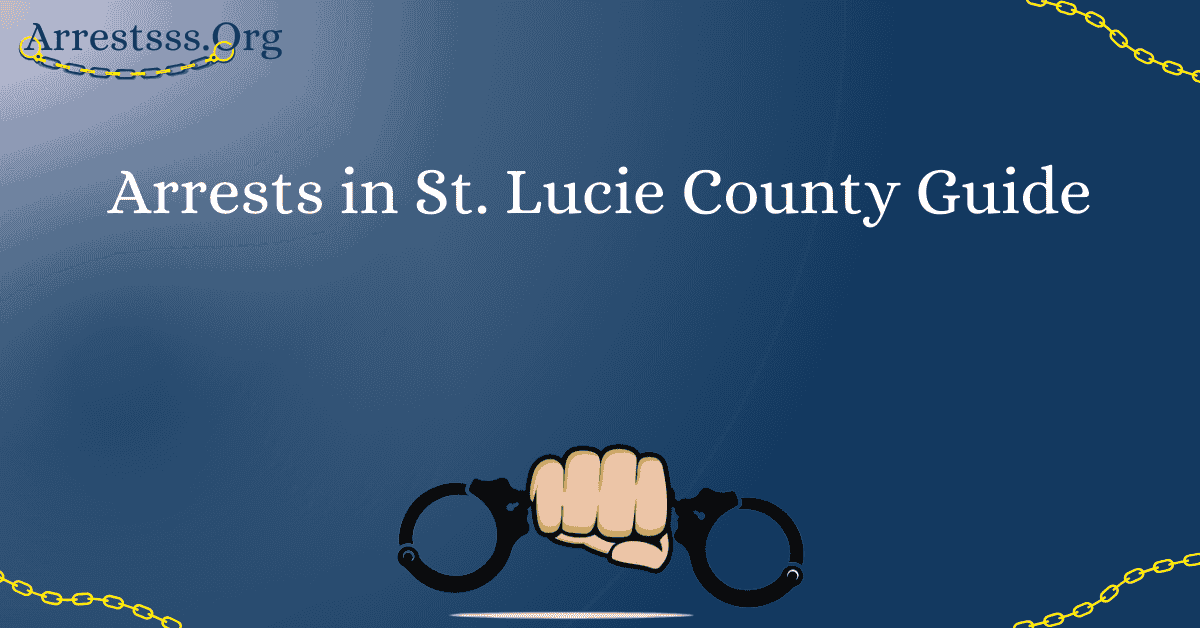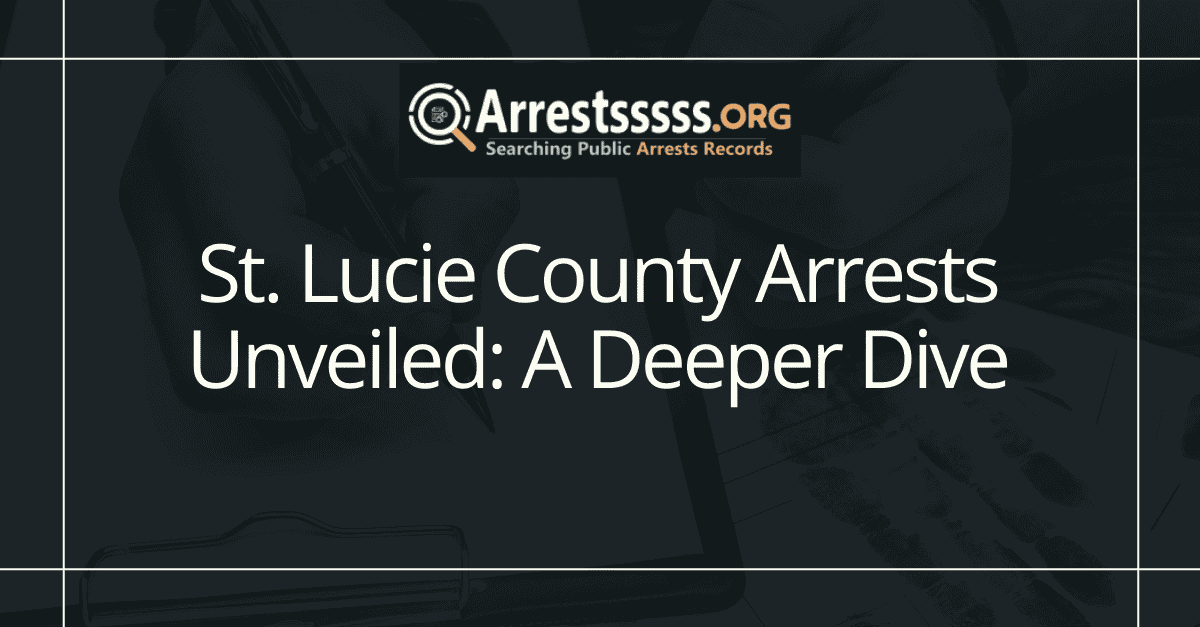Accessing St. Lucie arrests records county is crucial for individuals seeking transparency, safety, and accountability in their community. Whether you're conducting background checks, researching public safety, or verifying someone's criminal history, understanding how to obtain these records is essential. This guide provides detailed insights into the process, resources, and legal considerations surrounding St. Lucie County arrest records.
St. Lucie County, located in the heart of Florida's Treasure Coast, has a robust system for maintaining public arrest records. These records are vital for ensuring transparency and upholding justice. By exploring this topic, you'll gain a better understanding of the mechanisms in place and how to utilize them effectively.
In today's digital age, access to public records has become easier than ever. However, navigating the complexities of St. Lucie County's arrest records system requires knowledge and guidance. This article will walk you through everything you need to know, from the basics to advanced tips, ensuring you're well-equipped to find the information you seek.
Read also:Pearson Vue Cna License Renewal Pa A Comprehensive Guide For 2023
Understanding St. Lucie Arrests Records County
What Are Arrest Records?
Arrest records, often referred to as police reports or booking records, document the details of an individual's arrest. These records typically include information such as the date and time of arrest, the nature of the offense, the arresting officer's name, and any related court proceedings. In St. Lucie County, these records are maintained by local law enforcement agencies and are accessible to the public under Florida's public records laws.
Understanding the components of an arrest record is essential for anyone seeking this information. Key details often include:
- Personal information of the arrested individual
- Details of the alleged offense
- Date and location of the arrest
- Booking photographs and fingerprints
- Case disposition and court outcomes
Legal Framework for Public Records in St. Lucie County
Florida's Public Records Act
The Florida Public Records Act ensures that citizens have the right to access government records, including arrest records. This legislation promotes transparency and accountability by allowing individuals to request and review documents related to law enforcement activities. In St. Lucie County, the Sheriff's Office and local police departments adhere to these regulations, making it easier for residents to obtain the information they need.
Some important considerations under this act include:
- Who can request public records
- How to file a formal request
- Timeframes for processing requests
- Exceptions to public access
How to Access St. Lucie Arrests Records County
Online Resources for Records Search
With advancements in technology, accessing St. Lucie arrests records county has become more convenient through online platforms. The St. Lucie County Sheriff's Office provides an official website where individuals can search for arrest records using specific identifiers such as name, date of birth, or case number. Additionally, third-party websites offer comprehensive databases that aggregate information from various sources, making the search process faster and more efficient.
Key benefits of online searches include:
Read also:Taurus Scorpio Friends Exploring The Dynamics Of This Unique Friendship
- 24/7 availability
- Instant results
- Reduced costs compared to traditional methods
- Easy navigation and user-friendly interfaces
Steps to Request Arrest Records in Person
Visiting the Sheriff's Office
For those who prefer a more traditional approach, visiting the St. Lucie County Sheriff's Office in person is an option. This method allows you to interact directly with staff and ensure the accuracy of the information you receive. To prepare for your visit, gather all necessary details, such as the full name of the individual, date of birth, and any known case numbers.
Steps to follow include:
- Locating the nearest records office
- Scheduling an appointment if required
- Providing required identification
- Completing the necessary forms
Common Challenges in Obtaining Arrest Records
Privacy Restrictions and Exemptions
While the Florida Public Records Act promotes transparency, there are certain restrictions and exemptions to consider. Sensitive information, such as juvenile records or cases involving national security, may not be accessible to the public. Additionally, some records may be sealed or expunged based on legal proceedings.
Understanding these limitations is crucial for managing expectations when searching for arrest records. Common challenges include:
- Identifying sealed or expunged records
- Dealing with incomplete or outdated information
- Navigating privacy laws and regulations
Importance of Arrest Records in St. Lucie County
Promoting Community Safety
Arrest records play a vital role in promoting community safety and accountability. By providing access to this information, St. Lucie County empowers residents to make informed decisions about their surroundings. Whether you're conducting a background check for employment purposes or verifying someone's criminal history, these records serve as a valuable resource.
Key benefits of accessing arrest records include:
- Enhanced personal safety
- Improved decision-making
- Increased transparency in law enforcement
Best Practices for Using Arrest Records
Ethical Considerations and Responsible Use
When utilizing St. Lucie arrests records county, it's important to adhere to ethical guidelines and responsible practices. Misuse of this information can lead to unintended consequences, such as discrimination or invasion of privacy. Always ensure that your intentions align with legal and ethical standards.
Best practices include:
- Verifying the accuracy of the information
- Respecting individual privacy rights
- Using records for legitimate purposes only
Data and Statistics on Arrests in St. Lucie County
Understanding Local Crime Trends
St. Lucie County, like many other regions, experiences a variety of criminal activities. According to recent statistics from the Florida Department of Law Enforcement (FDLE), arrests in the county have shown a steady decline over the past decade, reflecting improved law enforcement strategies and community engagement.
Key statistics to consider:
- Decrease in violent crime rates
- Increase in non-violent offenses
- Impact of community policing initiatives
Resources and Tools for Further Research
Official Websites and Contact Information
For those seeking additional information, several resources are available to assist with your research. The St. Lucie County Sheriff's Office website provides comprehensive details on accessing arrest records, while the FDLE website offers statewide data and statistics. Additionally, local libraries and community organizations may offer support and guidance.
Useful resources include:
- St. Lucie County Sheriff's Office
- Florida Department of Law Enforcement
- Local libraries and community centers
Conclusion
In conclusion, understanding and accessing St. Lucie arrests records county is an essential tool for promoting transparency, safety, and accountability. By following the steps outlined in this guide, you can effectively navigate the system and obtain the information you need. Remember to adhere to ethical guidelines and responsible practices when utilizing these records.
We invite you to share your thoughts and experiences in the comments section below. Your feedback helps us improve and expand our content. Additionally, feel free to explore other articles on our site for more valuable insights and resources.
Table of Contents
- Understanding St. Lucie Arrests Records County
- Legal Framework for Public Records in St. Lucie County
- How to Access St. Lucie Arrests Records County
- Steps to Request Arrest Records in Person
- Common Challenges in Obtaining Arrest Records
- Importance of Arrest Records in St. Lucie County
- Best Practices for Using Arrest Records
- Data and Statistics on Arrests in St. Lucie County
- Resources and Tools for Further Research
- Conclusion


